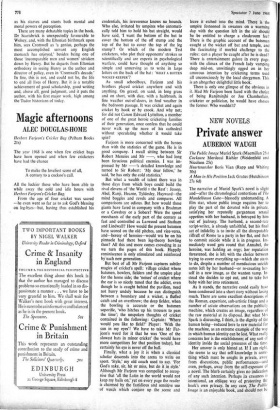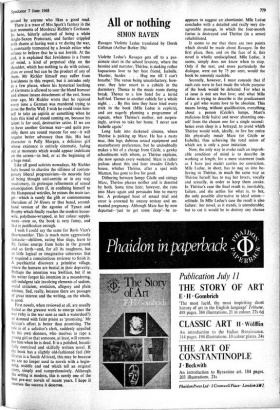NEW NOVELS
Private answer
AUBERON WAUGH
The Public Image Muriel Spark (Macmillan 25s) Cocksure Mordecai Richler (Weidenfeld and Nicolson 25s) Heartsnatcher Boris Vian (Rapp and Whiting 30s) A Man in His Position Jack Gratus (Hutchinson 27s 6d) The narrative of Muriel Spark's novel is slight and—after the chronological contortions of The Mandelbaunz Gate—blessedly undemanding. A film star, whose public image requires her to play the part of the devoted wife in private, satisfying her reputedly gargantuan sexual appetites with her husband, is betrayed by him out of jealousy. The husband, a second-rate script-writer, is already unfaithful, but his final act of infidelity is to invite all the disreputable riffraff of Rome to a party in her flat, and then to commit suicide while it is in progress. Im- mediately word gets round that Annabel, the heroine, was holding an orgy; her reputation threatened, she is left with the choice between trying to cover everything up—which she starts to do, despite a number of mendacious suicide notes left by her husband—or re-creating her- self in a new image, as the wanton vamp. In- stead she decides to opt out, and to take her baby with her into retirement.
As it stands, the narrative could easily have been condensed into a short story without losing much. There are some excellent descriptions of the Roman, expatriate, sub-artistic fringe and a number of astute observations on the publicity machine, which creates an image, regardless of the raw material at its disposal. But what Mrs Spark is discussing, I think, is the dignity of the human being—reduced here to raw material for the machine, as an extreme example of the way in which human identity can be lost. What really concerns her is the establishment of any sort of identity inside the social pressures of the time.
Her answer is only hinted at. If I am right, she seems to say that self-knowledge is some- thing which must be sought in private, away from discussions, public performances—and even, perhaps, away from the self-exposure of a novel. The blurb certainly gives no indication of any such intention. Perhaps its crassness is intentional, an oblique way of protecting the book's own privacy. In any case, The Public Image is an enjoyable book, and should not be
missed by anyone who likes a good read.
There is a trace of Mrs Spark's fantasy in the best moments of Mordecai Richler's Cocksure. Its hero, bitterly ashamed of being a white Anglo-Saxon Protestant, and further crippled with shame at having won a vc during the war, is constantly tormented by a Jewish editor who refuses to believe that he is not Jewish. At the end, it is explained that Jewishness is a frame of mind, a kind of perpetual chip on the shoulder, which has nothing to do with colour, class or creed but can be the product of any of them. Mr Richler himself may suffer from lewishness in this respect, but it intrudes only in a few places, where his hysterical loathing of Germans is allowed to sour the bland humour and almost insane detachment of the rest. Some time ago, Mr Richler wrote that he rejoiced every time a German was murdered trying to cross the Berlin Wall. I wish he could train him- self to take an aspirin or something when he feels this kind of mood coming on, because his talent is for cool, destructive satire. If we are to have another German war—and quite pos- sibly there are sound reasons for one—it will require better advocacy than this. His best character is Polly Morgan, a delicious girl whose existence is entirely cinematic, fading out at moments which would appear indelicate on the screen—in bed, or at the beginning of a huge meal.
Like all good satirists nowadays, Mr Richler feels bound to chastise the silliness of contem- porary liberal progressivism—its neurotic fear of being thought anti-semitic or in any way reactionary, its grotesque refinements of sexual emancipation. Even if, in confining himself to the Hampstead weirdies, he misses the main tar- get—which is surely the glib or commonsense liberalism of 24 Hours or that banal, second- hand version of the agonies of Tynan and Brophy which finally reaches the modern house- wife, polythene-wrapped, in her colour supple- ment—even so, the book- is very funny, and that is justification enough.
I wish I could say the same for Boris Vian's Heartsnatcher. This is much more aggressively fantastic—children, eating blue slugs, learn to fly; fairies emerge from holes in the ground and so forth—and, for all its toughness, has so little logical or imaginative coherence that It required a conscientious reviewer to finish it. A psychiatrist discovers a primitive village, where the humans are bestial in their depravity. Perhaps the intention was Swiftian, but if so the writer forgot his intention in a meandering, self-indulgent tale involving elements of sadism, social criticism, eroticism, allegory and plain whimsy. Sad, really, because there are passages of great interest and the writing, on the whole, is good.
First novels, when reviewed at all, are usually hailed as the greatest work to emerge since the war (why is the war seen as such a watershed?) or damned with faint praise as 'promising.' Mr Gratus's effort is better than promising. The tale is of a solicitor's clerk, suddenly appalled by his own dimness, who resolves to rape a young girl so that someone, at least, will remem- ber him when he is dead. It is a polished, beauti- fully contrived and skilfully written novel. If the book has a slightly old-fashioned feel (Mr Gratus is a South African), this may be because we are no longer used to novels with a begin- ning, middle and end which tell an original story, simply and comprehensively. Although the setting is modern, this is surely one of the best pre-war novels of recent years. I hope it receives the success it deserves.







































 Previous page
Previous page